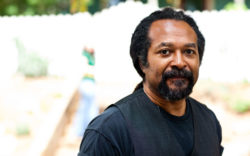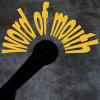Though this column is titled Poetlandia, the term should be interpreted in the broadest sense. All literary genres are welcome, it’s just that “Poetlandia” sounds better than “Poet-and-fiction-and-playwright-and-hip-hop-landia.” It is easier to slip a poem or two into a column, but going forward, I plan on slicing and dicing and pushing and shoving other genres into the mix.
Like many young writers, Matthew Nye has lived all over—the Midwest, New England, Utah and now Georgia. Being in Athens has given him “access to another local history, for one, and it’s also put all the other places I’ve lived in sharper contrast,” he says. He hopes that this “consciousness bleeds into my writing in terms of being more able to particularize place, character and broader voice with a greater understanding.”
A native of Indiana, Nye loves the camaraderie and time to write that living in Athens and attending UGA’s English and creative writing PhD program have given him. But even after four years, he still can’t quite get used to the heat and humidity. So you can find him keeping cool and reading in the library stacks, or in the State Botanical Gardens on gentler days. Nye’s first novel, Pike and Bloom, was awarded the 2014 Madeleine P. Plonsker Prize and will be published in early 2016.
Nye’s ability to contrast and particularize place is visible in this excerpt from the short story “Bruised in a Manner of Feeling,” recently published in The Chicago Review, about the steelworkers of Gary, IN. Situated in one of the most beautiful places, Gary is, and I mean no offense, one of the ugliest cities. It lurks in its own particular chemical haze, a haunting reminder of environmental destruction. Yet in this excerpt, Nye treats the workers of this tough and gritty city with a particular lyrical tenderness, turning their work into a sort of sci-fi, Shakespearian landscape of mixing cultures and metals, a rich world in a once-rich city.
The vesselmen wear sick hyphenated names, Selby-Bigge or Ariew-Garber. They grow pocked skin and terrier mustaches—pour out a heat of steel without euphemism or complaining calls, or thinking about the sloughs, the bosh, their boisterous uncouth bodies—how love in the bronze age must have been different than it is now with steel.
The superintendent prefers the Irish and the Scots. Germans and Slovaks—the odd Manx from the Isle of Man. New Hungarians and Poles arrive—the Vistula and Danube—and all the while the superintendent avers insistently that they are all good workers. That only slightly less grand is the Grand Calumet, and Hungarians and Poles aside, US Steel is fully American even though the river must move.
They are calling Gary the Magic City, created as if out of nothing, and with little flowering gardens. All the homes have garden plots, and all the workers garden—compete for a small cash prize at the end of the year for best soy, best corn, and best tomato. The soil was sandy and unfit, but soil too can be imported, just like the workers, just like the coke, the ore—Elbert H. Gary’s little transplanted eden and little fuck you to Pittsburgh, Pennsylvania.
If the tuyeres through which air is injected into the furnace melt down to a point where the molten metal threatens to flow into the air cavity, the first and second helpers mend the nozzle by covering and stoppering it with clay. The vesselmen continually wrestle with the destructive capacities of the molten metal, continually lose, and the whole furnace must be shut down if the air cavity fills. In order to fix it, taking a damn long time to cool off first.
The veteran vesselmen play a game with the new workers, telling them that they must touch a flaming hot ingot of steel with their bare hands. They tell the new workers that they have all already done this and nod—to the ones who are praying and crying, that they can’t pray here. The stripper is a large rectangular press used to create the raw ingots, which are then sent to the cooling pits to cool for a while.
Upcoming Events: Lauren Groff, best-selling author of Fates and Furies, Thursday, Sept. 17, 6:30 p.m., Avid. Poets Johnny Damm, Kyla Sterling and Reginald McKnight, Friday, Sept. 18, 6:30 p.m., Avid. Roy Scranton, author of Learning to Die in the Anthropocene, Thursday, Sept. 24, 6:30 p.m., Avid.
Send your literary events and brief prose or poetry (along with a bio) to [email protected].
Like what you just read? Support Flagpole by making a donation today. Every dollar you give helps fund our ongoing mission to provide Athens with quality, independent journalism.










